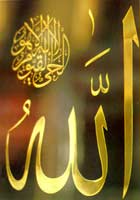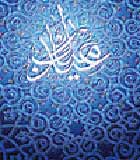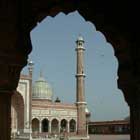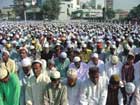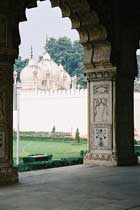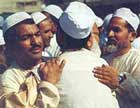The sizeable Muslim communities have their Eids [2] in common with Muslims across the world. Iddu'l Fitr and Iddu'l Zuha are two festive occasions widely celebrated by Muslims in India.
Eid-ul-Fitr and Eid-ul-Adha remain unique by their significance. These dates have no relevance with the life of Holy Prophet (Peace Be Upon Him) of Islam. Unlike some of the festivals in other major religions, these are not related to any significant event in the life of Prophet Muhammad (PBUH) like his birth or death anniversary
Contrary to the usual practice in many Muslim countries, where Eid-uz Zuha, is the major Muslim festival, Idd-ul-Fitr is celebrated with greater enthusiasm all over the country, and one can see Muslims of all age groups and from all strata of society attired in new clothes, visiting mosques to offer their prayers (namaaz) of thanks to God.
The Eid marks the end of Ramadan, the fasting month. The faithful gather in the mosques to pray, friends and relatives visit and revisit each other to exchange greetings. Prayers, family get-togethers and feasts are the major highlights of the celebrations. The family elders conveying their blessings give presents to their younger ones.
For Muslims, Ramadan is a special month of the year. During the month of Ramadan, Muslims fast from dawn to sunset every day. It is a time for inner reflection, devotion to God and self-control and self-restraint. The sighting of the new moon at the end of Ramadan heralds the celebration of Idd ul-Fitr.
Idd-ul-Fitr is celebrated the next day after the crescent for the 10th lunar month of the Islamic calendar is sighted. The Muslims are ordained to observe fast for 30 days (sometimes 29 days, depending upon the visibility of the crescent) starting with the sighting of the new moon and end it after seeing the new moon the next month.
The Muslims believe that the holy Quran was revealed during this month and that Prophet Mohammad (PBUH) was chosen by God to be His Last Messenger and Prophet. The Holy Muslim Scripture is the last and final word from God to the mankind.
Fasting is mandatory for all adult Muslim men and women, except the insane, infirm, sick or travelling and pregnant females and feeding mothers.
They have to compensate for the missed days by choosing to fast some other time of the year. Those who cannot fast, except with great hardship, must arrange to feed at least one needy person in lieu of the days one missed out on fasting.
Apart from bringing the Muslims face to face with the hard realities of life like the pangs of hunger, thirst and deprivation, Ramadan is an annual training period inculcating discipline and declaration of subservience to the laws of God, enumerated in the holy Quran. A Muslim is told to give Sadaqa (charity) and Fitra (alms given at the end of Ramadan but before the Eid prayers) to the poor and is recommended to recite the Quran intensively during the holy month.
One of the five pillars of Islam is Zakat – a sort of religious tax. It is obligatory upon all Muslims to give 2.5 % of wealth and assets each year (in excess of what is required) to the needy and the destitute. Paying Zakat is Fard (obligatory). The devout Muslims must pay their Zakat during the Ramadan month to enable the needy and the destitute to celebrate the Eid.
[1]Commonly known as the “Eid”, which literally means
“festival, festivity, celebration”.
Other forms of the word represent difference of dialects and languages spoken
in various parts of the country.
[2]Eid-ul Fitr and Eid-uz Zuha
Thanks to Dr. H. U. Qureshi for his suggestions and corrections.



